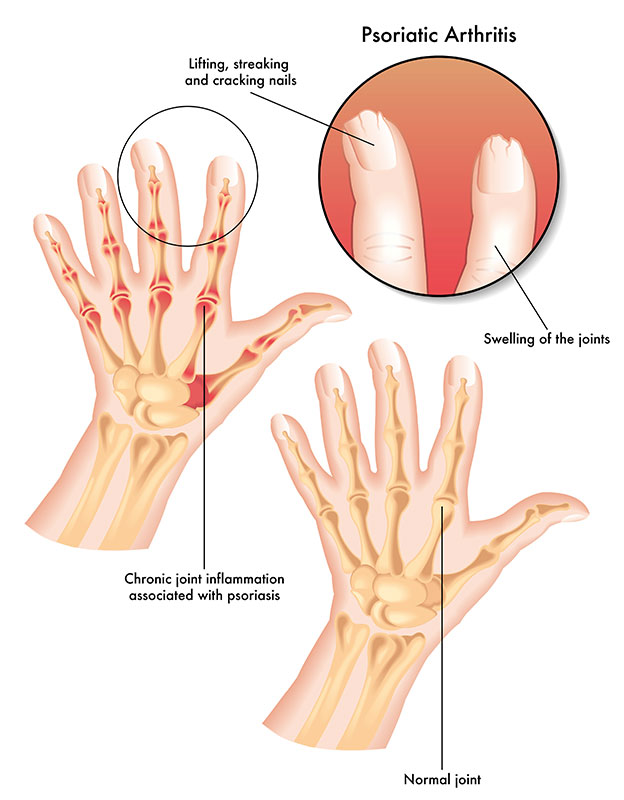Psoriatic Arthritis: Joint Inflammation Linked to Psoriasis
Psoriatic arthritis is a chronic inflammatory joint condition that develops in some individuals who have psoriasis affecting the skin or nails. The joints most commonly affected include the knees, hips, spine, and the joints closest to the tips of the fingers and toes.
Although psoriatic arthritis closely resembles rheumatoid arthritis, it does not produce the specific antibodies seen in rheumatoid arthritis. The exact cause remains unknown, but genetics play a role. Individuals with a family history of psoriasis or certain genetic markers are at a higher risk.
In Canada, psoriatic arthritis is a significant concern due to its impact on mobility, workplace function, and long-term joint health, particularly in physically demanding occupations.
Signs and Symptoms of Psoriatic Arthritis
Inflammation most often affects the small joints of the hands and feet, but larger joints and the spine may also be involved.
Common symptoms include:
-
Swollen, painful joints (often asymmetrical)
-
Joint stiffness, especially in the morning
-
Deformity of affected joints with long-term inflammation
-
Back or spinal pain in some individuals
-
Nail changes such as pitting or separation from the nail bed
Psoriatic arthritis may appear before or after skin symptoms. In many cases, psoriasis patches are hidden in areas such as the scalp, navel, or skin folds (including between the buttocks and thighs), making diagnosis more challenging.
Joint symptoms and skin flare-ups often appear and subside together.
Diagnosis of Psoriatic Arthritis
Diagnosis is based on:
-
Presence of joint inflammation
-
History of psoriasis (personal or family)
-
Exclusion of other conditions such as rheumatoid arthritis
There is no single diagnostic test. Blood tests are used to rule out rheumatoid arthritis, and X-rays help assess joint damage and disease progression.
Management and Treatment
Treatment focuses on reducing inflammation, managing skin symptoms, and preventing joint damage.
Common treatment options include:
-
Non-steroidal anti-inflammatory drugs (NSAIDs) for pain and stiffness
-
Methotrexate or cyclosporine to suppress immune activity
-
Tumor necrosis factor (TNF) inhibitors, which are highly effective
-
Phototherapy combined with oral psoralen for skin symptoms
While phototherapy may improve skin and joint symptoms, it may be less effective for spinal involvement.
Early treatment is essential to preserve joint function and maintain quality of life.
Why This Matters for First Aid & Workplace Safety
Psoriatic arthritis can affect grip strength, balance, endurance, and mobility, increasing the risk of workplace injuries. First aid and workplace safety training help Canadians recognize chronic joint conditions, adapt tasks safely, and respond appropriately to flare-ups.
Important Disclaimer (Embedded)
For Educational Purposes Only
This information is provided for first aid education and health awareness in Canada. It is not a substitute for professional medical diagnosis or treatment. Individuals with persistent joint pain or skin symptoms should consult a qualified healthcare provider.

